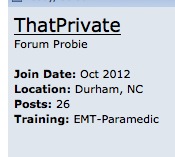ThatPrivate
Use to be "that private" now I'm "that specialist"
- 48
- 0
- 6
I started paramedic school this pass Monday. I completed EMT-basic class in December. During my basic class my instructor talked about different career opportunities within EMS. Other then 911 the one that interest me the most is tactical EMS. I plan on taking a tactical medical operator course over the summer and get my TEMT certificate. My question is how do you find TEMS jobs? I plan on living in either Georgia, South Carolina, Maryland or Virginia and working primary 911 in a medium busy system (8-12 average call per shift). If anyone can help me out I would greatly appreciate it.

